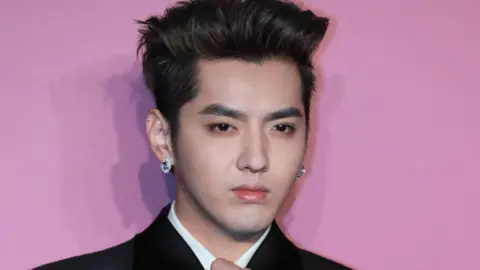China cracks down on celebrity online culture
 Getty Images
Getty ImagesSina Weibo - China's Twitter equivalent - is to remove an online celebrity list following criticism by state media of celebrity culture on social media.
State-owned newspaper People's Daily criticised platforms that make stars out of "unworthy individuals".
It did not specify any companies but the article comes during a wider crackdown on online firms in China.
Weibo said its decision was due to what it described as "irrational support" some fans were showing for celebrities.
Earlier this week Economic Information Daily, also run by the state, hit out at games firms, saying that many teenagers had become addicted to online gaming.
Shares in Tencent and NetEase fell by more than 10%. in the wake of the criticism.
The article in the People's Daily argued that teenagers were hugely influenced by social media and often chose the celebrities they followed based on their popularity on online platforms.
Weibo's list ranked stars on the popularity of their social-media posts and the number of follows they received.
Other platforms that allow fans to interact with celebrities include Bilibili, Kuaishou and ByteDance-owned Douyin, the Chinese version of TikTok.
One of China's biggest celebrities, pop star Kris Wu, was arrested at the weekend on suspicion of rape, accused of deceiving young women into having sex.
He denies all the allegations.

Kerry Allen, China media analyst
There have been increased concerns in China's media about the influence that celebrity culture has on young Chinese. Concerns were raised earlier this year by officials at China's Two Sessions, one of the most important annual events in the government calendar.
There has been growing concern that fan clubs can mobilise, either in person or online, to stage protests for their favourite stars. Chinese news website Sixth Tone has recently also noted a trend of influencer agencies "hiring click farms" to artificially inflate the presence of popular figures.
With the recent detention of popular Chinese singer Kris Wu, media platforms have gone all out to remove fan clubs associated with the artist, and his music has been pulled from online streaming services.
State media have urged a broader rectification of "fan culture", and social-media platforms like Sina Weibo know that, as safe spaces for young people, they have to ensure that their platforms represent socially responsible role models.
Beijing wants to ensure that young people are getting a healthy message online from "wholesome" role models.
However, a message is also being delivered that the fans themselves need to act appropriately. A year on from the coronavirus outbreak, media outlets tell fans that they can no longer organise huge gatherings in support of their idols, and that they should refrain from mobilising to post abuse at stars they don't like.
